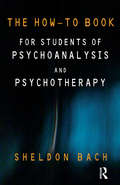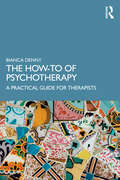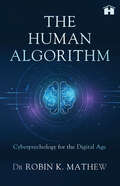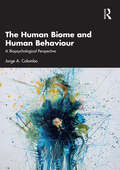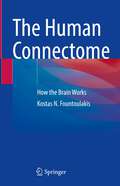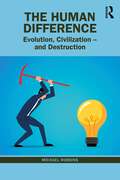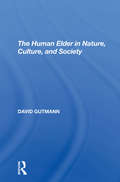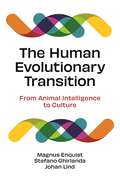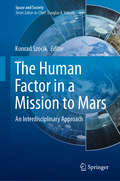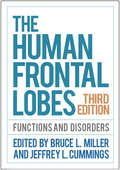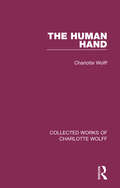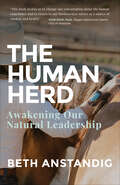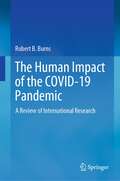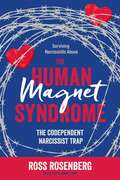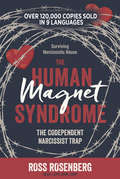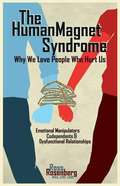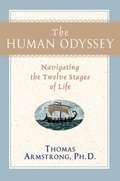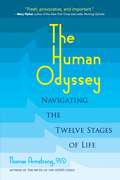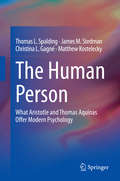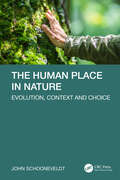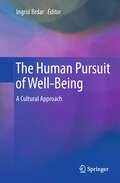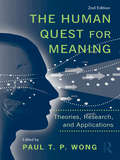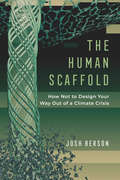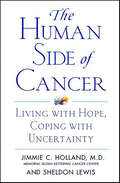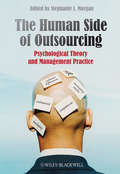- Table View
- List View
The How-To Book for Students of Psychoanalysis and Psychotherapy
by Sheldon BachThis is a book that grew out of the many practical "how-to" questions that the author's psychotherapy students have asked him over the years. It is neither an evidence-based compendium nor an attempt to summarize general practice or the viewpoints of others, but rather a handbook of practical answers to many of the questions that may puzzle students of psychotherapy and psychoanalysis. Some of the short chapters include: How to choose a personal psychoanalyst. How to do an initial interview. How to listen to a patient. How to recognize and understand self-states, multiple identities, true and false selves, etc. How to tell what the transference is. How to deal with the sadomasochistic transference. How to understand the need for recognition. How to think about analytic processHow to practice holistic healing. How to refer a patient for medication. How to get paid for your work. How to manage vacations, weekends, illnesses, no-shows and other disturbances of continuity.
The How-To of Psychotherapy: A Practical Guide for Therapists
by Bianca DennyThis is an essential guide for therapists at the beginning of their career. It goes beyond academic theory to provide readers with confidence and competence around core aspects of therapeutic processes, so they can contend with professional and ethical issues as well as assist in establishing their identity and standing as a therapist.Informed by years of clinical work and supervision, Bianca Denny presents practical answers to burning questions in an authoritative and accessible manner. The book offers plain language explanations of common dilemmas that often flummox trainee and early career therapists, such as keeping time in session, coping with "imposter syndrome", decisions around managing confidentiality, and working with patients who get under your skin. These are accompanied by practical tips and ready-to-implement skills, encouraging readers to consider the application of these skills to the patients and presentations in their current practice. Further supported by diagrams, tables, and call-out boxes, the book is easy to navigate and revisit throughout the first weeks, months, and years of a career in psychotherapy.Practical and accessible, this book is ideal for trainee and early-career psychologists, psychotherapists, counsellors, social workers, and other helping professionals.
The Human Algorithm
by Robin K. MathewIn today&’s hyperconnected world, our lives have become increasingly intertwined with the technology we interact with. While innovations like smartphones and the Internet have brought unprecedented convenience and connectivity, they have also introduced new risks and challenges.In The Human Algorithm, Dr Robin K. Mathew takes readers on an eye-opening exploration of the complex digital landscape and our ever-evolving engagement with it. With chapters delving into smartphone addiction, the impact of technology on cognitive development, threats such as cyberbullying, online predators, and the dark web, this book shines a revelatory light on the often-overlooked aspects of our online existence. This comprehensive work also dedicates chapters to the internet&’s role in fuelling anxiety and hypochondria, the emergence of cyber dating and romance, and the potential of artificial intelligence (AI), among other crucial topics.All in all, this richly researched and compellingly argued compendium will equip you with the knowledge and insights to navigate the digital age with awareness and resilience.
The Human Biome and Human Behaviour: A Biopsychological Perspective
by Jorge A. ColomboThe book represents a critical update on interactions between the host and its gut microbiome that conditions the socio-biology of the mind and behaviour. Evidence has been scientifically approached and reveals that our conscious behaviour involves a complex interplay of multiple non-conscious domains, including complex host-gut microbiome relationships.The book describes trends and issues on which there is increasing evidence of the impact of host-gut microbiome interactions on behaviour and cultural construction of self-perception. This suggests the need to re-evaluate traditional, basic concepts of human development. Additionally, it calls attention to open issues involving conceptual themes on neurobiological integration and its impact on early developmental and social domains on the typical extended period of human postnatal helplessness during which the basic scaffolding of mental development is completed. It also deals with the impact of poverty and inadequate early feeding habits on individual cognitive development, performance, and social construction. It discusses the need to reformulate views and policies on social marginalisation, child poverty, and malnutrition involving host-gut microbiome imbalances.The spectrum of possible behaviours in all species and its plasticity depends on an integrated vector of basic components involving the genetic code, social and physical environmental, developmental conditions, the relative condition of dominance or submission in social settings –or prey/predator in the Natural Kingdom– and on its physiological and anatomical construction profiles.Graduate, postgraduate and teachers interested in areas connected with anthropology, social medicine, early education, and health policymakers will benefit greatly from this book.
The Human Connectome: How the Brain Works
by Kostas N. FountoulakisThis book constitutes the end result of 20 years-long effort that goes beyond a Psychiatrist’s standard clinical training and education, even that of a Psychiatrist that follows an academic career. Trying to explain how the human mind works is hard and the heterogeneity of the audience make the attempt even more difficult. There is a conceptual difference between the words ‘brain’ and ‘mind’and this makes the effort even more difficult since the present book tries to preserve the strict scientific approach concerning all the topics discussed. The work elaborates and tries to answer questions frequently phrased by audiences in teaching classes and in conferences and does not avoid any question. In order to achieve this goal, it is structured in chapters all the way from the molecule and the cell to consciousness and free will. The book targets mainly the mental health care professionals as an audience, and to a lesser extend the other health professionals. It is written according to the author’s view concerning the training and educational needs of Psychiatrists and Psychologists and to a lesser degree of Neurologists and Neuroscientists in general.
The Human Difference: Evolution, Civilization – and Destruction
by Michael RobbinsFrom a multi-disciplinary perspective grounded in psychoanalysis, this book explores the manifestations of mind that distinguish humans from other species, culture, civilization, and destructiveness. Psychoanalysis was created by Freud in an effort to understand neurosis and psychosis, the names he gave to individual human destructiveness. His understanding was limited and incorrect because the science of evolution and the disciplines of sociology and cultural anthropology were in their infancy when he formulated his ideas. He did not comprehend that destructiveness is qualitatively different in humans than in other species and he ignored the problem of how biological instincts become mental processes. These limitations left psychoanalysis with one of its most perplexing unsolved problems, the mysterious leap from mind to body. This book explains how neoteny, the prolonged period of post-natal immaturity that distinguishes humans from other animals, requires and enables complex learning from caregivers. It is the knowledge acquired from this learning and its intergenerational transmission that links the biological theory of evolution with the psychosocial theory of psychoanalysis and explains how the human species is unique. This book will be of interest to those who want to learn about how integrating the findings of evolutionary science, primatology, sociology and cultural anthroplogy with the theory of psychoanalysis expands our understanding of what makes humans unique and its implications for the future of our species, and empowers us to influence the destiny of humankind.
The Human Elder In Nature, Culture, And Society
by David GutmannChronicling the evolution of David Gutmann's cross-cultural, empirical studies on which his developmental theories of aging are based, this volume reveals how descriptions of the developmental sequences (as they show themselves in older men and women) lead to identification of the psychological forces that drive these processes across the years. This book of new and previously published work first reports on the research that buttressed the more hopeful view of aging as a period of growth and then sets forth the broad, unifying ideas that came out of the empirical work. These concepts include the theory of the "Parental Imperative"—the engine of human development in early and later adulthood; observations on the "gentling" of the older man and the increased assertiveness of the older woman; essays about the unique qualities of aging leaders and the special role of the aged as representatives of the community to its gods; and ideas about the evolutionary basis of the third age—aging as a human adaptation, a legitimate life stage, rather than the grim prelude to death. The last group of selections focuses on the clinical perspective, applying developmental insights to the psychological disorders of later life, ultimately leading to a more hopeful view of these conditions as well as more effective approaches to their treatment. Each section contains original commentary placing the material in the context of current research. This text is for gerontologists, for all students of human development, and for all thoughtful readers who are concerned with the great themes of the human life-cycle—in-cluding their own.
The Human Evolutionary Transition: From Animal Intelligence to Culture
by Magnus Enquist Stefano Ghirlanda Johan LindA major new theory of why human intelligence has not evolved in other speciesThe Human Evolutionary Transition offers a unified view of the evolution of intelligence, presenting a bold and provocative new account of how animals and humans have followed two powerful yet very different evolutionary paths to intelligence. This incisive book shows how animals rely on robust associative mechanisms that are guided by genetic information, which enable animals to sidestep complex problems in learning and decision making but ultimately limit what they can learn. Humans embody an evolutionary transition to a different kind of intelligence, one that relies on behavioral and mental flexibility. The book argues that flexibility is useless to most animals because they lack sufficient opportunities to learn new behavioral and mental skills. Humans find these opportunities in lengthy childhoods and through culture.Blending the latest findings in fields ranging from psychology to evolutionary anthropology, The Human Evolutionary Transition draws on computational analyses of the problems organisms face, extensive overviews of empirical data on animal and human learning, and mathematical modeling and computer simulations of hypotheses about intelligence. This compelling book demonstrates that animal and human intelligence evolved from similar selection pressures while identifying bottlenecks in evolution that may explain why human-like intelligence is so rare.
The Human Factor in a Mission to Mars: An Interdisciplinary Approach (Space and Society)
by Konrad SzocikA manned mission to Mars is faced with challenges and topics that may not be obvious but of great importance and challenging for such a mission. This is the first book that collects contributions from scholars in various fields, from astronomy and medicine, to theology and philosophy, addressing such topics. The discussion goes beyond medical and technological challenges of such a deep-space mission. The focus is on human nature, human emotions and biases in such a new environment.The primary audience for this book are all researchers interested in the human factor in a space mission including philosophers, social scientists, astronomers, and others. This volume will also be of high interest for a much wider audience like the non-academic world, or for students.
The Human Frontal Lobes, Third Edition: Functions and Disorders
by Jeffrey L. Cummings Bruce L. MillerThis authoritative work, now thoroughly revised, has given thousands of clinicians, students, and researchers a state-of-the-art understanding of the human frontal lobes--the large brain region that plays a critical role in behavior, cognition, health, and disease. Leading experts from multiple disciplines address the anatomy and chemistry of the frontal cortex, neuropsychological assessments of capabilities unique to the frontal lobes, the nature of (and possible treatment avenues for) frontotemporal dementia and related conditions, and implications for understanding and treating neuropsychiatric disorders, such as schizophrenia, mania, and depression. Illustrations include eight pages in full color. New to This Edition: *Reflects a decade of important research advances in such areas as functional connectivity mapping of frontal and frontal-subcortical circuits. *Incorporates significant new information on frontotemporal dementia and other neurological disorders. *Expanded section on neuropsychiatric disorders, with new chapters on apathy, dissociative states, and antisocial behavior. *Chapters on salience networks, normal brain aging, white matter diseases, and clinical trials. *Increased attention to brain processes involved in moral reasoning, empathy, decision making, and other key human capabilities.
The Human Hand (Collected Works of Charlotte Wolff #1)
by Charlotte WolffOriginally published in 1942, this book was very different from anything else written about the psychology of hands. The author had worked amongst apes and monkeys at the zoo, patients in what at the time were called ‘mental hospitals’, and amongst all manner of men, women and children. The results of her research are found here where she looks at how the hands link to the brain and ultimately our personality. A pioneer in this field the author continued her research in this area for a number of years. A fascinating glimpse into early personality psychology.
The Human Herd: Awakening Our Natural Leadership
by Beth AnstandigThe Human Herd is a guidebook that helps readers unleash their mammal instincts and shows them how to heighten their self-awareness, experience their lives more deeply, improve their relationships, and step into a more natural—and powerful—way to lead.
The Human Impact of the COVID-19 Pandemic: A Review of International Research
by Robert B. BurnsThis book is about the impact of the COVID-19 pandemic on human society. The current global pandemic has thrown a diverse set of entwined social, psychological, and economic disruptive impacts of human suffering on societies, groups, and individuals due to the flow on effects of not only the disease itself but massive dislocations of the everyday routines of life driven by mandated restrictions imposed by national governments. This intersecting set of experiences has evoked considerable human distress particularly in the fields of employment, education, healthcare work, and bereavement rituals. This text reviews, from existing knowledge and the research emanating in the last two years from around the world, the issues and problems faced by people and their governments.
The Human Magnet Syndrome: The Codependent Narcissist Trap
by Ross RosenbergThe Human Magnet Syndrome provides a life-changing and brilliant explanation for why patient and sacrificing codependents fall head over heels in love with beautiful and exquisitely interesting selfish and self-centered narcissists. Since the dawn of civilization, men and women have been magnetically and irresistibly drawn together into romantic relationships, not so much by what they see, feel and think, but more by invisible forces. When individuals with healthy emotional backgrounds meet, the irresistible “love force” creates a sustainable, reciprocal and stable relationship. Codependents and Pathological Narcissists are similarly enveloped in a seductive dreamlike state; however, it will later unfold into a painful “seesaw” of love, pain, hope and disappointment. The soul mate of the codependent’s dreams will become the narcissist of their nightmares. Readers will better understand why they, despite their dreams for true love, find themselves hopelessly and painfully in love with partners who hurt them. The Human Magnet Syndrome guides and inspires both the layman and the professional to break pathological attraction.
The Human Magnet Syndrome: The Codependent Narcissist Trap: Surviving Narcissistic Abuse
by Ross RosenbergA psychotherapist&’s guide to codependency, narcissism, the treatment of narcissistic abuse, and achieving healthy love from yourself and others.Since the dawn of civilization, people have been magnetically and irresistibly drawn together, not so much by what they see, feel, and think, but more by invisible, unconscious romantic forces. This seductive, alluring, and seemingly impossible-to-avoid love force is the Human Magnet Syndrome. It bends oppositely-matched partners in a breakup-resistant, rollercoaster-like relationship.Magnetic-like attraction, or &“chemistry,&” brings codependents and narcissists together in an enchanting fantasy that can never be sustained. Given time, a codependent&’s soulmate dreams will predictably melt away, leaving them with the cellmate reality.This revised and updated, breakthrough book not only explains why codependents habitually fall prey to harmful and manipulative narcissists, but also why they predictably sabotage their dreams for freedom, happiness, and self-love. Rosenberg&’s pioneering work on relationships, codependency, and narcissism is a necessary road map for receiving healthy love—both from others and ourselves.Praise for The Human Magnet Syndrome&“I recommend The Human Magnet Syndrome to those who work in social services, education, chemical dependency, or the counseling fields and to the people they touch. It&’s time to wake up and this brilliant book sounds the alarm we need.&”—Melody Beattie, bestselling author of Codependent No More &“This book will help anyone understand the attractors of love and consequent suffering. I recommend it to couples who are mystified by the depth and repetition of their pain, and to therapists whose destiny is to help them.&”—Harville Hendrix, bestselling co-author of Getting the Love You Want and creator of Imago Relationship Therapy
The Human Magnet Syndrome: Why We Love People Who Hurt Us
by Ross RosenbergSince the dawn of civilization, men and women have been magnetically and irresistibly drawn together into romantic relationships, not so much by what they see, feel and think, but more by invisible forces. When individuals with healthy emotional backgrounds meet, the irresistible “love force” creates a sustainable, reciprocal and stable relationship.
The Human Odyssey: Navigating the Twelve Stages of Life
by Thomas ArmstrongTravel through the first stirrings of life in the womb to the anticipation of death and even beyond. In a unique synthesis, Thomas Armstrong draws on a wide range of sources from various disciplines and cultures to fashion a compelling narrative. The core of this enlightening guide consists of 12 chapters, each describing a different period of life, with its own unique changes, struggles, and growth. A final chapter poses the possibility that the voyage may even continue after physical death.
The Human Odyssey: Navigating the Twelve Stages of Life
by Thomas Armstrong"This is truly a major contribution — brilliant, beguiling, and as broad in concept as it is deep." — Jean Houston, PhD, author of The Possible HumanThomas Armstrong, Ph.D., an award-winning educator and expert on human development, offers a cross-cultural view of life's entire journey, from before birth to death to the possibilities of an afterlife. Dr. Armstrong cites both clinical research and anecdotal evidence in a comprehensive view of the challenges and opportunities we face at every stage of our development. His accessible narrative incorporates elements of history, literature, psychology, spirituality, and science in a fascinating guide to understanding our past as well as our future."I loved the tone, the pacing, the sense of audience, and especially the richness of the associations . . . It's a book that one would like to keep around — a guidebook even." — John Kotre Ph.D., co-author of Seasons of Life: The Dramatic Journey from Birth to Death "The Human Odyssey is superb, magnificent, astonishing, unique, engrossing, eminently readable, informative, enjoyable, entertaining, profound. What else? I could go on. I hadn't expected anything like so remarkable a book." — Joseph Chilton Pearce, author of The Crack in the Cosmic Egg and Magical Child "I have read through The Human Odyssey. It is in many ways impressive. I also think that it has great commercial potential. Many people will find attractive your dual focus on the scientific and the soul/spiritual dimensions." — Howard Gardner, Ph.D., The John H. and Elizabeth A. Hobbs Professor in Cognition and Education at the Harvard Graduate School of Education, author of Frames of Mind "I extend my congratulations to you for this monumental undertaking and wish you the very best for your impressive efforts." — Marian Diamond, Ph.D. Professor, Department of Integrative Biology, University of California, Berkeley; co-author of Magic Trees of the Mind; pioneer researcher into the effect of the environment on brain development; dissected Einstein's brain "I very much enjoyed The Human Odyssey. Your breadth of sources is remarkable, and you have put them all together in a smooth and integrative way. I think it will be informative for people, and also inspiring for them to make their stages of life more meaningful. Overall, this is an impressive tour de force." — Arthur Hastings, Ph.D., Professor and Director, William James Center for Consciousness Studies, Institute of Transpersonal Psychology; Past President, Association of Transpersonal Psychology "Extraordinary. I hope that it is read by many people." — Laura Huxley, widow of Aldous Huxley, founder of Children: Our Ultimate Investment, and author of This Timeless Moment, and The Child of Your Dreams "A wonderful and encyclopedic summary of human development." — Allan B. Chinen, M.D., Clinical Professor of Psychiatry, University of California, San Francisco; author of Once Upon a Mid-Life: Classic Stories and Mythic Tales to Illuminate the Middle Years and In the Ever After: Fairy Tales and the Second Half of Life "Absolutely remarkable. The Human Odyssey is written with lively scholarship and contains great depth and breadth, a wide range of fascinating materials, and many useful resources. It's a kind of 'everything book.'" — George Leonard, "the granddaddy of the consciousness movement" (Newsweek) and author of The Transformation and The Ultimate Athlete"The Human Odyssey provides readers with a fresh approach to developmental psychology. Dr. Armstrong has included a spiritual dimension of human growth that is lacking from most accounts but which is essential for a complete understanding of the human condition. It is a splendid, brilliant work." — Stanley Krippner, Ph.D., former president of the Association for Humanistic Psychology, author of Personal Mythology: The Psychology of Your Evolving Self, and co-editor of The Psychological Impact of War Trauma on Civilians: An International Perspective "An integral approach to human development, from birth to death, that provides practical information for all who
The Human Person: What Aristotle and Thomas Aquinas Offer Modern Psychology
by Thomas L. Spalding James M. Stedman Christina L. Gagné Matthew KosteleckyThis book introduces the Aristotelian-Thomistic view of the human person to a contemporary audience, and reviews the ways in which this view could provide a philosophically sound foundation for modern psychology. The book presents the current state of psychology and offers critiques of the current philosophical foundations. In its presentation of the fundamental metaphysical commitments of the Aristotelian-Thomistic view, it places the human being within the broader understanding of the world. Chapters discuss the Aristotelian-Thomistic view of human and non-human cognition as well as the relationship between cognition and emotion. In addition, the book discusses the Aristotelian-Thomistic conception of human growth and development, including how the virtue theory relates to current psychological approaches to normal human development, the development of character problems that lead to psychopathology, current conceptions of positive psychology, and the place of the individual in the social world. The book ends with a summary of how Aristotelian-Thomistic theory relates to science in general and psychology in particular. The Human Person will be of interest to psychologists and cognitive scientists working within a number of subfields, including developmental psychology, social psychology, cognitive psychology, and clinical psychology, and to philosophers working on the philosophy of psychology, philosophy of mind, and the interaction between historical philosophy and contemporary science, as well as linguists and computer scientists interested in psychology of language and artificial intelligence.
The Human Place in Nature: Evolution, Context and Choice
by John SchooneveldtThis book explores a new approach to understanding the evolution of mind and consciousness by examining the perceptual abilities of animals and the way they experience their world. It offers a science-based bottom-up approach to our own conscious worldview by seeing it through the eyes of others. Emphasis is on the role of context in evolution and the way animals internalize and engage with the contextual properties of their world that are meaningful for them. The core argument is that a context, which is subjective and comprised of the perceptual capacities, offers new insights into the evolution of mind. Rather than seeing biological evolution in terms of the emergence of mindless forms and cultural evolution as the emergence of disembodied minds, the book seeks to integrate these two perspectives through the rigorous mapping of contexts.Key Features Reveals an understanding of animal minds Formulates a hypothesis for the evolution of consciousness Includes a discussion of the origin of technological innovation Provides a rationale for the ecology of mind Proposes a theory of the evolution of language Outlines the science of experience and how it influences choice Explains the role of context and choice with respect especially to human ecology
The Human Pursuit of Well-Being
by Ingrid BrdarThis book brings together the latest research on positive psychology from an international cast of researchers and particularly from the growing body of European researchers. The chapters describe research and practice from diverse fields of positive psychology, covering topics such as happiness and well-being, motivation and goals, personality, academic performance and coping, measurement and interventions. The book emphasizes a cultural approach to the human pursuit of well-being. It is unique in that it presents research from a range of cultures, such as Russia, Croatia, and Egypt, in addition to ten different Western cultures. This approach helps broaden our understanding of those aspects of human experience that make life worth living in diverse cultural conditions. The book includes well-known and new authors from the field and contains selected papers that were presented at the 4th European Conference of Positive Psychology held in 2008 in Croatia.
The Human Quest for Meaning: Theories, Research, and Applications (Personality and Clinical Psychology)
by Paul T. P. WongThe first edition of The Human Quest for Meaning was a major publication on the empirical research of meaning in life and its vital role in well-being, resilience, and psychotherapy. This new edition continues that quest and seeks to answer the questions, what is the meaning of life? How do we explain what constitutes meaningful relationships, work, and living?The answers, as the eminent scholars and practitioners who contributed to this text find, are neither simple nor straightforward. While seeking to clarify subjective vs. objective meaning in 21 new and 7 revised chapters, the authors also address the differences in cultural contexts, and identify 8 different sources of meaning, as well as at least 6 different stages in the process of the search for meaning. They also address different perspectives, including positive psychology, self-determination, integrative, narrative, and relational perspectives, to ensure that readers obtain the most thorough information possible. Mental health practitioners will find the numerous meaning-centered interventions, such as the PURE and ABCDE methods, highly useful in their own work with facilitating healing and personal growth in their clients. The Human Quest for Meaning represents a bold new vision for the future of meaning-oriented research and applications. No one seeking to truly understand the human condition should be without it.
The Human Scaffold: How Not to Design Your Way Out of a Climate Crisis (Great Transformations #2)
by Josh BersonHumanity has precipitated a planetary crisis of resource consumption—a crisis of stuff. So ingrained is our stuff-centric view that we can barely imagine a way out beyond substituting a new portmanteau of material things for the one we have today.In The Human Scaffold, anthropologist Josh Berson offers a new theory of adaptation to environmental change. Drawing on niche construction, evolutionary game theory, and the enactive view of cognition, Berson considers cases in the archaeology of adaptation in which technology in the conventional sense was virtually absent. Far from representing anomalies, these cases exemplify an enduring feature of human behavior that has implications for our own fate.The time has come to ask what the environmental crisis demands of us not as consumers but as biological beings. The Human Scaffold offers a starting point.
The Human Side of Cancer: Living with Hope, Coping with Uncertainty
by Sheldon Lewis Jimmie C. HollandFor more than twenty years, Dr. Holland has pioneered the study of psychological problems of cancer patients and their families -- whom she calls "the real experts." In The Human Side of Cancer, she shares what she has learned from all of them about facing this life-threatening illness and what truly helps along the cancer journey. This book is the next best thing to sitting in Dr. Holland's office and talking with her about the uncertainty and anxiety elicited by this disease. And it is a book that inspires hope -- through stories of the simple courage of ordinary people confronting cancer.
The Human Side of Outsourcing: Psychological Theory and Management Practice
by Stephanie J. MorganOutsourcing is now a strategic choice for many companies and a continuing issue for managers and consultants. The transfer, negotiation and ongoing management of outsourced contracts all demand a great deal of people management. Yet, while the implications for those directly affected may be numerous and wide-ranging, very little has been written on how to sensitively and successfully manage the transfer of such individuals – along with the emotional needs of those left behind. This book considers The Human Side of Outsourcing, integrating theory and practice to offer state-of-the-art advice for those responsible for implementation in the field along with insightful analysis for researchers and students of work psychology. Examining problems and solutions from employee and employer perspectives, Stephanie J. Morgan provides an in-depth study of the psychological theory, management practice and level and type of support required to engage staff and improve outcomes. Real-world case studies illustrate all the key issues involved, along with their implications for HR, line management, organizational performance and employees themselves.
